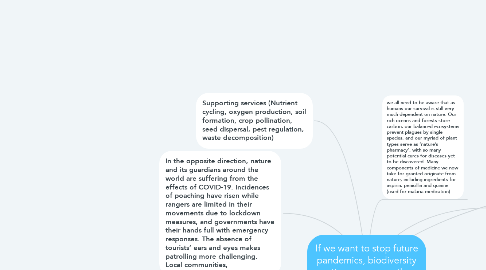If we want to stop future pandemics, biodiversity matters now more than ever
by CRISTIAN DANIEL DE LUCIO LIRA

1. In the opposite direction, nature and its guardians around the world are suffering from the effects of COVID-19. Incidences of poaching have risen while rangers are limited in their movements due to lockdown measures, and governments have their hands full with emergency responses. The absence of tourists’ ears and eyes makes patrolling more challenging. Local communities,
2. Supporting services (Nutrient cycling, oxygen production, soil formation, crop pollination, seed dispersal, pest regulation, waste decomposition)
3. Supporting services (Nutrient cycling, oxygen production, soil formation, crop pollination,
4. Regulating services (Climate regulation and stabilisation, storm buffers, water and air
5. purification, flood protection, protection of soils from erosion
6. Poaching can affect the environment by depleting certain species of animals. It causes animals that are endangered to become extinct, thus creating a disruption in the food chain. Eventually, it will cause as a result new adaptations of animals, and/or species beyond human control.
7. Major outbreaks of zoonotic diseases (infectious diseases caused by pathogens jumping from animals to humans) are associated with the increasing loss of natural habitats.
8. Outbreaks like Ebola and HIV also emerged from areas where forests, among the biodiverse habitats of our planet, were disappearing.
9. we all need to be aware that as humans our survival is still very much dependent on nature. Our rich oceans and forests store carbon, our balanced ecosystems prevent plagues by single species, and our myriad of plant types serve as ‘nature’s pharmacy’, with so many potential cures for diseases yet to be discovered. Many components of medicine we now take for granted originate from nature, including ingredients for aspirin, penicillin and quinine (used for malaria medication).
10. seed dispersal, pest regulation, waste decomposition)
11. Cultural services (Recreation, aesthetic and psychological value, knowledge)
12. All development strategies and activities must prioritize biodiversity and find a way to create jobs, generate incomes and increase wellbeing, without destroying nature.
13. The livestock industry and farmers have to implement adequate biosafety measures
14. Funders need to ramp up investment in virology and bioinformatics, while the international community needs to improve cooperation, increase local capacities and raise awareness about these fields of knowledge


